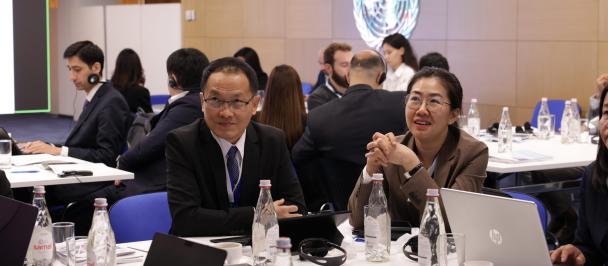Consolidated Report of the participants of the National Preventive Mechanism (NPM) was presented that highlighted the results of preventive visits in 2019-2020. According to the report, 24 persons were convicted In 2019 under the Article 146 («torture») of the Criminal Code of the Republic of Kazakhstan whereas in 2020 this number was 13 people.
NPM serves as a form of public control of the closed state institutions that works to identify and prevent torture and other cruel, inhuman or degrading treatment or punishment.
The task of the experts involved in the work of NPM is to regularly visit places where people are isolated from society, and monitor the implementation of their rights and freedoms. The year 2020 has marked a successful seven-year period of NPM activity in Kazakhstan, coordinated by the Office of Commissioner for Human Rights with the support of the United Nations Development Program (UNDP) and other international organizations.
The composition of the NPM includes members of public oversight commissions, public associations, lawyers, social workers, independent forensic experts, and doctors.
NPM members can perform 3 types of monitoring: regular visits; intermediate visits related to confirmation of the elimination of previously identified violations in the institutions, as well as special visits taken to check against complaints and reports on torture and other cruel treatment or punishment. The number of institutions covered by the NPM is currently over 3,000 throughout the country.
«In his Address to the People, the President of the Republic of Kazakhstan emphasized once again the importance of the concept of the Listening State that targets development of the state apparatus acting exclusively for the interests of citizens. This primarily concerns local executive bodies. If government agencies promptly respond to reports on human rights violations, take high-quality preventive measures to eliminate the causes that contribute to such violations, then we will receive effective results, namely, decrease of social tension and increase of public trust to the state authorities, as well as strengthening the responsibility of public officials», - Ms Elvira Azimova, the Commissioner for Human Rights in the RK drew attention in her remarks.
As indicated in the report, considering the pandemic situation and introduction of the state of emergency in Kazakhstan from March 16 through May 11, 2020, the Commissioner for Human Rights as the Chairman of the NPM Coordination Council advised to postpone the presentation of the NPM Consolidated Report for 2019 till the next year. The current report accordingly covers the results of the NPM work in 2019-2020.
Due to coronavirus pandemic, many countries have imposed restrictions on visiting people in closed institutions that created additional risks of abuse.
In Kazakhstan, despite the conditions of the state of emergency, NPM participants did not suspend their work. During the quarantine period, they have conducted 159 preventive visits, 43 video calls (online interviews) and 58 phone consultations with persons in detention places,. The number of preventive visits in the past year increased to 517, which exceeded the the 2019 figures by 22 visits.
As noted by Yakup Beris, UNDP Resident Representative in the Republic of Kazakhstan, NPM participants carried out 1,012 preventive visits, which covered all types of the closed institutions and revealed many cases of human rights violations, which is especially important against the backdrop of the COVID-19 pandemic: «NPM has proved its value and importance in addressing the challenges of preventing torture and ill-treatment in closed institutions, which is especially relevant given the global COVID-2019 pandemic. We saw that the NPM in Kazakhstan followed the recommendations of the UN Committee for the Prevention of Torture and successfully continued preventive visits during the quarantine regime».
Elvira Azimova also emphasized that this work in such a challenging environment continued primarily thanks to the mutual agreement of the National Center for Human Rights with the regional NPM groups- who carried out their work under strict observance of sanitary standards to conduct visits.
The total number of recommendations given by NPM members following the results of preventive visits in 2020 was 3319. Recommendations were given about the conditions of detention (residence) of persons and their medical care, food, education, provision of necessary clothing and leisure.
As of today, 937 (or 28%) of these recommendations have been implemented, while 2341 (or 70.5%) are at the stage of implementation, and 41 recommendations (1.2%) have not been accepted by the authorized bodies.
The report also provides data with regard to the criminal cases due to use of torture in closed institutions. In 2019, 24 people were convicted under Article 146 («torture») of the Criminal Code of the Republic of Kazakhstan was, while in 2020 – this number reached 13 people.
In 2020, 41 officials were convicted under part four of Article 362 of the Criminal Code of the Republic of Kazakhstan (abuse of power or official powers with the use of violence or the threat of its use) (38 officials in 2019).
«NPM activities that assess the effectiveness of the fulfillment of obligations in the field of human rights by international and non-governmental organizations is an important factor for human rights protection. To continue this important work, it is vital to sustain interaction of the Commissioner for Human Rights with civil society, which requires constant strengthening and improvement», - the report highlights.
In this regard, a three-year project was initated in 2019, that is being implemented jointly with the United Nations Development Programme in the Republic of Kazakhstan. The project «Strengthening the National Preventive Mechanism for the Prevention of Torture», aims at institutionalizing the reporting and monitoring system of institutions, improvement the work of NPM in the field of preventive visits and enhancing the professional capacity of NPM participants.

 Locations
Locations



